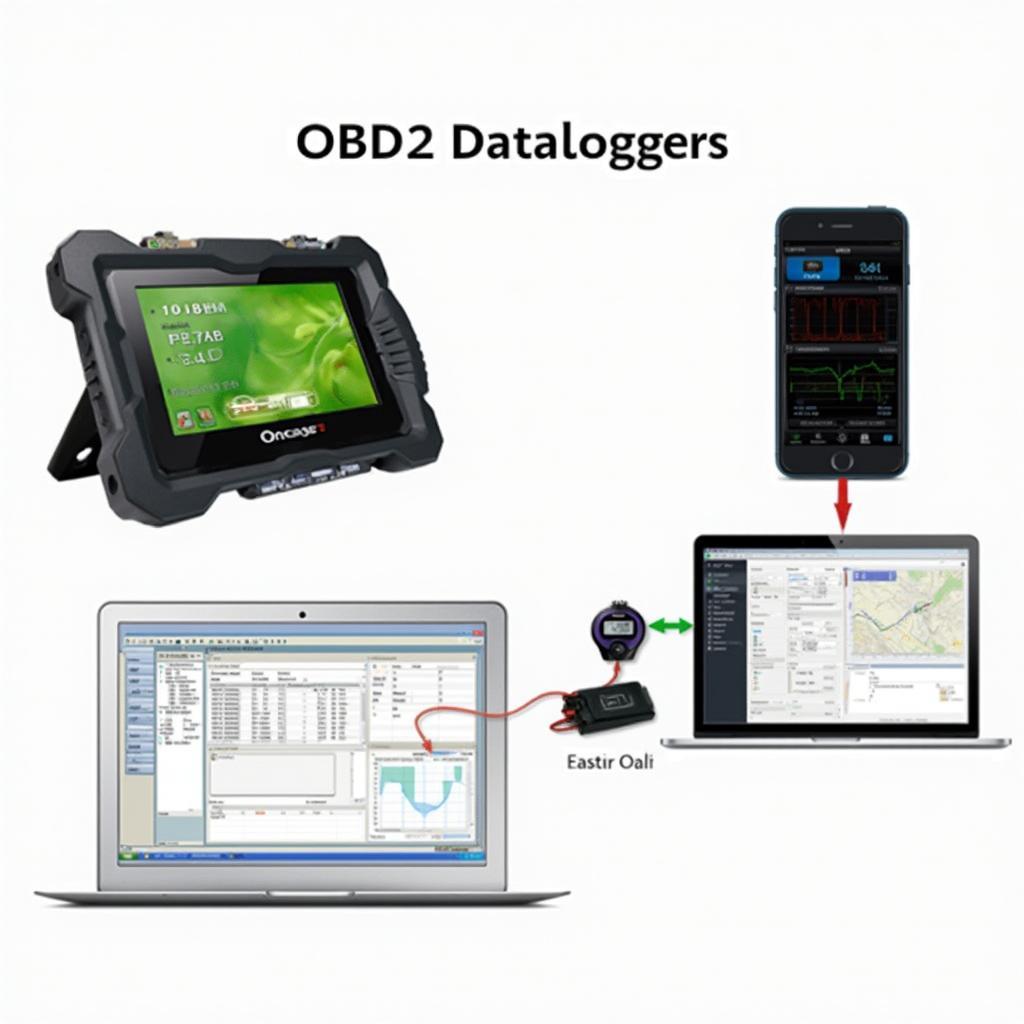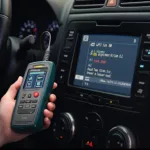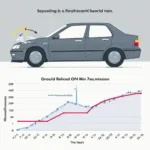An OBD2 datalogger is a powerful tool that can unlock a wealth of information about your vehicle’s performance. It allows you to record various parameters from your car’s onboard computer, providing valuable insights for diagnostics, performance tuning, and even fuel efficiency monitoring. From understanding your car’s health to optimizing its power, an obd2 datalogger can be an essential asset for any car enthusiast or professional mechanic.
What exactly is an OBD2 datalogger and why should you consider using one? This comprehensive guide dives deep into the world of OBD2 dataloggers, exploring their functionality, benefits, various types available, and how to choose the right one for your needs. We’ll also cover how to effectively use an OBD2 datalogger and analyze the data it collects.
Choosing the Right OBD2 Datalogger for Your Needs
The market offers a wide range of OBD2 dataloggers, each designed with specific features and functionalities. Selecting the best one depends heavily on your individual needs and technical expertise.
Types of OBD2 Dataloggers
-
Standalone Dataloggers: These devices function independently and store data internally. They often feature a display for real-time data viewing and are ideal for those who prioritize portability and ease of use.
-
Software-Based Dataloggers: These leverage your smartphone or laptop along with an OBD2 adapter to record and display data. This option is often more affordable and offers a wider range of analysis tools through dedicated software applications.
-
Professional-Grade Dataloggers: Designed for advanced users, these dataloggers offer high sampling rates, support for a broader range of parameters, and integration with professional tuning software. They are ideal for motorsport applications and in-depth vehicle diagnostics.
“Choosing the right datalogger can be the difference between a simple overview and a deep dive into your vehicle’s performance,” says automotive expert, John Miller, ASE Certified Master Technician. “Consider your specific needs and the level of detail you require before making a purchase.”
Key Features to Consider
When choosing an obd2 datalogger, certain features play a crucial role in its effectiveness and usability.
Data Logging Parameters
The parameters a datalogger can record are crucial. Ensure it supports the specific parameters you need to monitor, such as engine speed, coolant temperature, throttle position, and fuel trim.
Sampling Rate
A higher sampling rate means more data points are captured per second, providing a more granular view of your vehicle’s performance. This is especially important for performance tuning and diagnostics.
Data Storage and Export
Consider the datalogger’s storage capacity and its ability to export data in various formats for analysis. Compatibility with common software like Excel or dedicated tuning software is essential.
For those seeking the best Bluetooth option, check out our guide on the best obd2 bluetooth datalogger.
Using Your OBD2 Datalogger and Analyzing the Data
Once you have chosen your datalogger, the next step is to put it to use and interpret the collected information.
Connecting and Recording Data
Connect the datalogger to your vehicle’s OBD2 port, usually located under the dashboard. Start the vehicle and initiate the data logging process using the datalogger’s interface or associated software.
Analyzing the Data
The collected data can be analyzed using various software tools. Look for patterns, anomalies, and deviations from expected values. This can help identify potential problems or areas for performance improvement.
“Analyzing the data is where the real power of the datalogger comes into play,” says Sarah Chen, automotive engineer. “By understanding the data, you can make informed decisions about maintenance, repairs, and performance upgrades.”
Learn more about export data from obd2 data logger for analysis on our website.
Conclusion
An OBD2 datalogger is a valuable tool for anyone looking to understand and optimize their vehicle’s performance. From simple diagnostics to advanced tuning, the insights provided by an obd2 datalogger can empower you to make informed decisions about your vehicle’s health and efficiency. By understanding the different types of dataloggers, their key features, and how to analyze the data, you can unlock a wealth of information about your car. You may also be interested in learning more about the racepak obd2 interface and obd2 kwp2000.
FAQ
- What is an OBD2 datalogger? An OBD2 datalogger records data from your car’s computer through the OBD2 port.
- Why use a datalogger? For diagnostics, performance tuning, and fuel efficiency monitoring.
- What types of dataloggers are available? Standalone, software-based, and professional-grade.
- What parameters can be logged? Engine speed, temperature, throttle position, and more.
- How do I analyze the data? Use dedicated software to identify patterns and anomalies.
- How much do dataloggers cost? Prices vary depending on features and functionality.
- Where can I buy a datalogger? Online retailers, auto parts stores, and specialty shops.
Need assistance? Contact us via WhatsApp: +1(641)206-8880, Email: [email protected] or visit us at 789 Elm Street, San Francisco, CA 94102, USA. We have a 24/7 customer support team.


